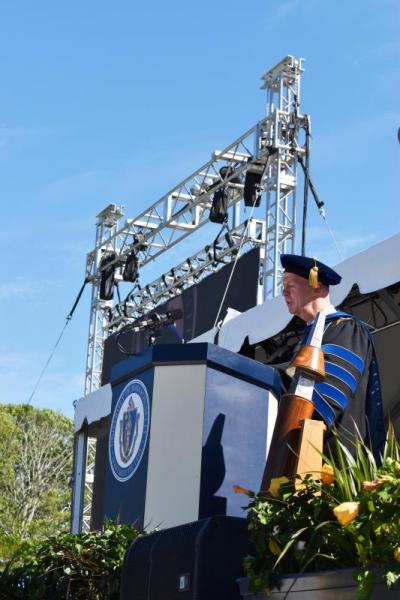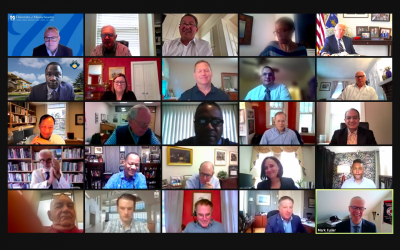Fuller named permanent chancellor at UMass Dartmouth
After months of searching, UMass Dartmouth’s interim chancellor Dr. Mark Fuller was tapped to permanently head the school.
UMass Board of Trustees announced his appointment at a meeting Monday.
Fuller has served as interim chancellor since replacing Mark Preble in January, when Fuller was named to that post by UMass President Marty Meehan.
“I am honored by the trust that President Meehan, Chair Manning, and the Board of Trustees are placing in me,” Fuller said. “Over the last seven months I have been inspired by the students, faculty, and staff of UMass Dartmouth and by the people and civic leadership of the South Coast.”
Prior to his appointment at Dartmouth, Fuller pent nine years as dean of UMass-Amherst’s Isenberg School of Management and three years as vice chancellor for advancement at the flagship campus.
The youngest of four boys growing up in Scottsdale, Ariz., Fuller is a first-generation college graduate.
His mother raised him as a single parent after the death of his father when he was five. She worked to help put her son through school while Fuller also helped pay his own way by working as a cardiac technician and taking out loans while studying for his bachelor’s, master’s, and eventually a Ph.D. from the University of Arizona.
Fuller was also a professor and department chair at Washington State University for nine years.
The appointment comes as UMass officials sought a leader who could “hit the ground running” and provide stability to the Dartmouth campus’ office.
UMass Dartmouth’s previous permanent chancellor, Robert Johnson, left for a new position as president of Western New England University after just three years in Dartmouth.
The previous chancellor, Divina Grossman, also remained in office for only three years.
“The importance of this decision cannot be underestimated,” Meehan said. “UMass Dartmouth needs and deserves a leader with a demonstrated track record of success in order to confront the complex challenges facing higher education institutions.”
A 20-member search committee had evaluated candidates since April.
UMass Trustee Stephen Karam, the chair of the Chancellor Search Committee, noted that there were 370 prospective candidates, with 95 interviewed by Greenwood/Asher & Associates, a third-party search committee — resulting in 69 formal applications.
From there, the UMass committee interviewed 11 candidates, narrowing it down to four finalists: Valdosta State University Provost Robert Smith, Dean of UCLA’s Herb Alpert School of Music Eileen Strempel, Iona College Provost Darrell P. Wheeler, and Fuller.
Each finalist was brought to the Dartmouth campus to meet with students, faculty, alumni, and other community stakeholders.
Meehan said one of the biggest qualities sought in a new chancellor was a willingness to live in the area and get the university more involved with the community and local businesses, especially in a region “where two urban centers are filled with great potential.”
“The candidate who best meets that criteria is Dr. Fuller,” he said.
Following Meehan’s recommendation, the Board of Trustees voted 15-1 in favor of Fuller.
"He's got the tools to do what is right," trustee Steve Tolman said.
Student trustee Narcisse Kunda was the lone dissent. He said that while he has a lot of respect for Fuller, some of his peers came forward with concerns over the candidate.
Kunda declined to share the concerns, but said they were previously outlined to committee members.
Another priority for the new permanent chancellor, Meehan said, is to boost enrollment at the Dartmouth campus.
According to the UMass president, undergraduates attending the Dartmouth campus have declined in eight of the past ten years.
In 2009, the university saw 7,252 undergraduates enrolled for the fall semester. In 2019, just before the pandemic, that number dropped to by nearly 2,000 to just 5,276 students.
Since 2014, retention rates have dropped by 9%, Meehan added.
“There is an awful lot of work to be done,” he said. “This campus has enormous potential — after a decade of leadership instability, the campus, students, faculty and staff need and deserve a leader who will see the job through.”














